Given the pending introduction of the Seasonal Employment Protection Act being led by Senators Graham (R-SC) and Padilla (D-CA), we thought it would be helpful to provide context on how we got to this point and why we decided to negotiate with our historical opposition, the labor unions.
Labor unions are considered a core constituency for Democrats. Most Congressional Democrats are strong union supporters and are hesitant to endorse any legislation or legislative language that is not supported by labor interests. Organized labor’s historical opposition to the H-2B program stems from the belief that H-2B workers take jobs from union members. On this basis, the unions have opposed employers’ efforts to obtain legislative H-2B cap relief.
We last secured a Returning Worker Exemption (RWE) in 2016. In subsequent years, after months of lobbying and strong Congressional support, the RWE was always stricken at the last minute. This is because Democratic leadership, previously Nancy Pelosi in the House and Chuck Schumer in the Senate, defer to labor union interests on anything H-2B related. Labor gives a thumbs down to an RWE and it is dropped. And all our hard work goes down the drain.
As the saying goes, the definition of insanity is doing the same thing over and over again and expecting a different outcome. Understanding this, we knew we needed the support of labor interests if we were ever going to have an opportunity to secure significant short-term and permanent cap relief. Otherwise, we were facing the uncertainty of the annual Department of Homeland Security (DHS) discretionary language for perpetuity.
February 2022
In early 2022, the National Association of Landscape Professionals and the Seasonal Employment Alliance (SEA) approached the Laborer’s International Union of North America (LiUNA), to see if they would be interested in a negotiation. This culminated in an agreement for a one-year RWE in exchange for excluding construction occupations from accessing the RWE. The intent was to include this in the FY22 Omnibus spending bill but unfortunately the agreement came together too late to be inserted.
June 2022
In June of 2022, Representative Andy Harris planned to propose a one-year RWE amendment to the FY23 House DHS Appropriations bill. Due to the grassroots outreach from our members and other stakeholders, Harris secured the votes to pass the amendment. But Democratic leadership, at the urging of the unions, killed the amendment at the last minute.
As a condition of Harris dropping the proposed amendment, The Democratic House Judiciary Committee agreed to a negotiation on a grand H-2B reform package. This negotiation commenced in July of 2022. The H-2B Workforce Coalition led the negotiations on behalf of all H-2B program stakeholders.
December 2022
By December it was clear the negotiations were dead. SEA then engaged directly with AFL-CIO in an attempt to restart the negotiations. This led to the H-2B Coalition coming back to the table for an all-day negotiation on December 15, 2022. After six hours of discussion, the coalition was unwilling to accept any restrictions on future H-2B program access for the construction and meatpacking industries.
With direction from the SEA board, SEA approached labor representatives and asked if they would be willing to continue the negotiations. Thanks to urging from Senator Durbin’s office (via a call from Senator Graham to Durbin), the negotiations resumed. This is when we proposed the Certified Seasonal Employer concept to give certainty to long-time, compliant users of the program.
This negotiation concluded with a deal, the first between industry and labor union interests. The American Homebuilders Association, Chamber of Commerce and the Meatpacking Associations opposed the deal over the proposed restrictions on future program access for the construction and meatpacking occupations. At our insistence, all current construction users of the H-2B program would be “grandfathered” in and would retain access to the program.
The deal was ultimately not included in the FY23 Omnibus due to opposition from Senate Judiciary Ranking Member Senator Chuck Grassley (R-IA).
February 2023
Understanding our pathway to permanent reform still went through Labor ally Dick Durbin (D-IL), we restarted negotiations in February of 2023. Senator Durbin tapped the Judiciary Immigration Committee Chairman, Alex Padilla, to be the Democratic lead on the bill. Senate Judiciary Committee ranking member Lindsey Graham is serving as the Republican lead. With Senators Durbin, Padilla and Graham, we have the support of three Senators whose support is necessary for the bill to have any chance of inclusion in a year-end spending package.
Throughout the negotiation process, we solicited feedback from H-2B stakeholders including NALP, OABA and AHLA. This resulted in the redline provisions, such as private right of action, being removed from the text.
October 2023
As of October 11, 2023, the language has been agreed to by all parties. We expect the legislation to be introduced soon.
We acknowledge there are provisions that remain controversial to some, but a perfect H-2B fix is not practical. To get anything done in Washington (or life) requires compromise. While there is plenty of compromise in this bill, SEA believes the permanent cap relief for long-time program users justifies the tradeoffs. We also believe the tradeoffs, while burdensome, are not unreasonable enough to jeopardize program stability for law abiding employers.
The next step is to secure a Republican and Democratic lead for a House companion bill. Off to the races we go!

